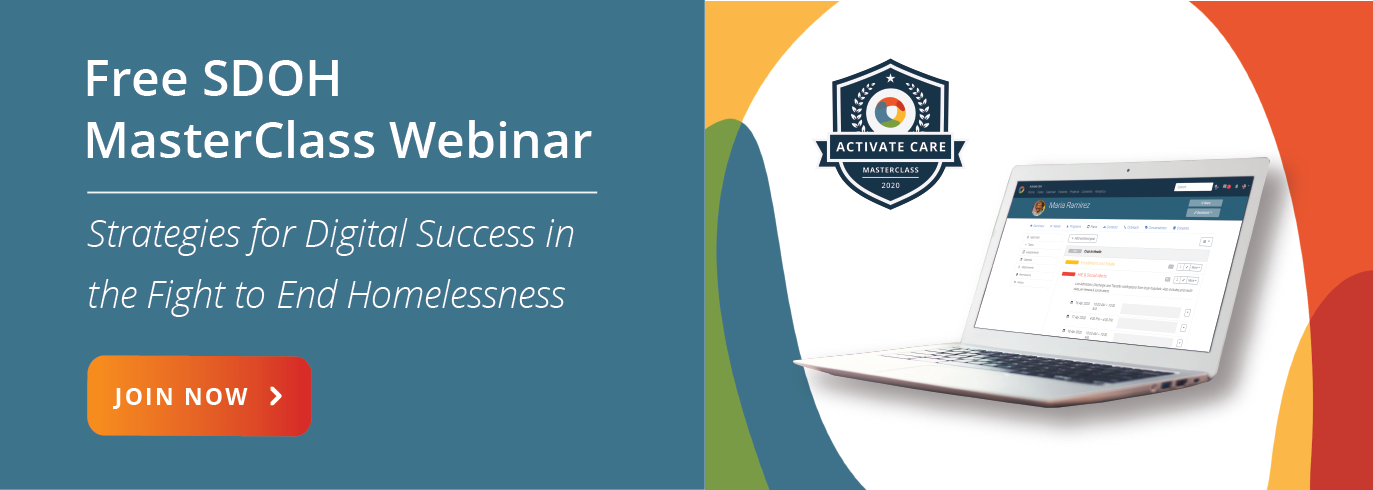Incorporating SDOH data in a medical setting has come to the forefront in recent years. Largely this is in part to the growing understanding that social needs have such a significant impact on both individual wellbeing and clinical outcomes. Boston Medical Center, for example, has incorporated a screening tool, THRIVE, into their medical record to evaluate patients’ social needs across eight domains. Others have turned to machine learning methods to extract this data from unstructured clinical notes.
Once social needs are identified for a given patient, they are then likely referred to another organization to get one or more of those unmet needs addressed. Some counties in the state of Oregon, for example, are partnering with Activate Care to enable their providers to send referrals to local organizations as part of their community health improvement initiatives. The aim is then for social services to meet the unmet needs of that patient.
Driving Towards a Standard Set of SDOH Terminology
A key challenge that faces all of these initiatives, however, is the lack of a structured vocabulary for these social needs that can be used to communicate between various systems effectively. Until the efforts from initiatives such as the Gravity Project become accepted and adopted, there is no standard set of interoperable terms that can be used, forcing each organization to come up with their own set of SDOH terminology.
This lack of a standardized coding system only exacerbates another barrier currently being faced: the fragmentation of SDOH needs data. Many medically-driven initiatives assume that the EHR is the repository of truth. Most of the community services that provide services to their clients, however, do not use or have access to the EHR. Many of these organizations receive referrals from multiple sources. This means that when a client is referred to them, the organization may only have a small picture of what is currently happening with the client and may not know the client's previous history.
In a world that provides distributed care in the community, tools, services, and procedures that are aimed for centralized care need to be rethought. This is analogous to how advancements in computing have changed how applications are written, maintained, and distributed. Gone are the days where there is a monolithic mainframe computer that everyone accesses, and much effort is now going into tools and systems for orchestrating, coordinating, and synchronizing non-homogeneous systems. In our decentralized world, all actors must have access to the key data so that they can make informed decisions and ensure that others stay up to date.
Activate Care’s Approach to SDOH Data in the EHR
The future of effectively addressing SDOH needs for patients, therefore, rests on the ability for any actor, whether they be in a medical setting or in a social setting, to view and assess the unmet needs, barriers, and facilitators of a patient and then be able to provide the necessary care for that patient. Being able to provide a holistic picture, and the ability to drive action in a manner that is understandable and observable by all parties involved is crucial to long term success. This will be especially important so that the load of all referrals can be balanced across the system so that providers don’t unwittingly refer patients to already overfilled service providers, as that has been shown to negatively impact outcomes.
With this in mind, we at Activate Care are expanding our platform to be ever more accessible to all members of the care continuum - by everyone from patients, their caregivers, and all the social and clinical staff that are helping them improve their lives. Integrations with HIEs allow us to receive vital clinical information (such as emergency room admissions), and our upcoming redesigned SMART on FHIR app enables clinicians to view and act on SDOH data in concert with the broader community directly from within their medical record. Patients always are the center of our attention. We strive to make it as easy as possible for patients to get involved in their own care alongside their care team in our platform.
Learn more about Activate Care's efforts to improve care in our free SDOH MasterClass: Strategies For Digital Success In The Fight to End Homelessness.
